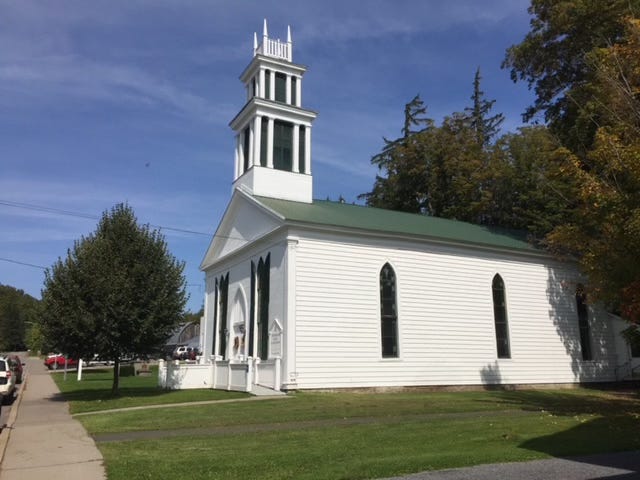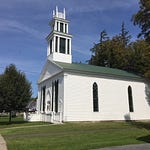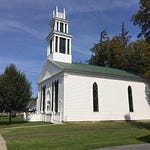Dear Friends,
I trust you had a great Christmas and a joyous New Year’s!
We’re running a day late, but here’s the first podcast for 2024. I appreciate your sharing the “good news!”
Thank YOU for joining me on The Church’s One Foundation.
Blessing Upon Blessing!
D. Paul
All We Like Sheep Have Gone Astray
Over Christmas week and New Year’s, I took time to listen again to George Frideric Handel’s Messiah. For those of us who sang this oratorio in high school, college, or church choirs, revisiting it is like putting on a pair of warm, comfortable slippers.
Fact and fiction surround its creation. Was it written in 7 days? No—24 days for the music—with a text drawn from the King James Bible and the Coverdale Psalter by Charles Jennens. Did the housekeeper really slip Handel’s food under the door? Doubtful, if portraits of Handel’s rather corpulent contours are accurate But this we do know with “certainty”: its premier was during the Easter season, not Christmas, at the Great Music Hall, Fishamble Street, in Dublin, on April 13, 1742, as a benefit for three charities: Mercer Hospital, Prisoner’s Debt Relief, and The Charitable Infirmary, with the evening’s proceeds securing the release of 142 indebted prisoners. The beneficence of Handel’s masterpiece continues nearly 300 years later.
Regardless of its stature in the panoply of choral music, from its sprightly string Overture, followed by the prophetic pining of “Comfort Ye My People,” through the mournful “Thy Rebuke Hath Broken His Heart,” to the soul-stirring “Hallelujah Chorus,” climaxing triumphantly in the “Worthy Is The Lamb That Was Slain - Amen” finale, Handel’s music, animated as it is by Scripture, eloquently tells us of the birth, life, death, resurrection, and ascension of our Lord Jesus Christ. Within that story, humanity’s story is told—our aspirations and failures, our obdurately sinful natures, and our great redemption— “I know my Redeemer liveth”—culminating in the unfathomable mystery, the believer’s resurrection from the dead—“In a moment, in the twinkling of an eye, we shall all be changed.” Handel’s three-part “meditation,” as some have called it, makes clear that it is in Christ’s story, that it is “in Him” that “we live and move and have our being” (Acts 17:28).
Movement # 27 of the Novello vocal score, “All We Like Sheep Have Gone Astray,” based on Isaiah 53:6 seems particularly fitting to the spirit of our Balkanized age. Has there ever been such a time? In seemingly unparalleled fashion, “We have turned everyone to his own Way”—lawlessness wherever you turn, merciless barbarity, rampant poverty, lavish wealth, insatiable consumption, yet an endless emptiness, manifested by our lonely youth in search of their stolen innocence and sexual identities.
Moments ago, my wife interrupted my writing to inform me of a homicide (police details forthcoming) that just took place a few hours ago at the intersection of Michigan Road and Grandview Drive, right around the corner from our house. I tell her that I was awakened at 5:30 a.m. by flashing red lights peeking through a crack in the curtains and whirling around our ceiling, but I turned over and covered my head, knowing that the police had arrived and would attend to yet another accident on Michigan and Cold Spring Road (our immediate corner), one of the most dangerous intersections in the city.
Now, looking out my 2nd-story office window, the police cars remain at the intersection no more than 50 yards from the house, with lit flares diverting traffic from the murder scene onto our street, the cars crawling cautiously below. “Yes,” I’m saying to myself, “there have been times such as these when “gross darkness covered the people.’” But strikingly, this darkness has descended on a nation once considered to be the “shining city on a hill,” now a truncated, broken nation with its boarders and urban centers in shambles. The visionaries are few if any, with crooks and narcissists posing as public servants and running for the highest office of the land. Our collective will to do something has dissipated, so we “turn over and cover our heads,” leaving it for someone else to take care of the mess.
The Church and America are living through a spiritual and moral free fall, with a secularized culture rejecting the “faith of its fathers” and worshipping those complementary idols of materialism and sexualization, no less pagan than those ancient idols of wood and stone found on the alters in mountainous “high places,” where Baal, the fertility god, was illicitly worshipped by peasants and princes alike.
Yet, as believers, we know that “…where sin abounded, grace did much more abound” (Rom. 5:20), so Handel leads us contrapuntally in a series of descending, ascending, and descending lines, finally bidding counterpoint adieu, and coming to a firm rest in that quiet, elongated, adagio passage of miraculous hope: “The Lord hath laid on Him the iniquity of us all.”
My friends, I am prompted to pause here and ask: how was your Christmas and New Year’s? As it is for many, was it a time of loneliness? I can relate, missing all three of my precious daughters. Was it a time of disappointment over past decisions? A time of broken relationships—perhaps a divorce? A time of financial anxiety, scrambling to make ends meet. A time of serious illness? The passing of a loved one? In one way or another, all of us can relate, for regardless of suffering’s various degrees, pain is a common denominator that binds us all.
But back to Handel as he employs the power of God’s transforming Word: Regardless of how challenging the days may be, “Fear not,” is still the angels’ message to us today. And the prophet still inspires us to “Arise, shine, for thy light is come and the glory of the Lord is risen upon thee (Isaiah 60:1). And Christ’s personal invitation for 2024 (sealed by His blood on the cross) remains the same: “Come unto me all ye that labor and are heavy laden, and I will give you rest.” For “…He hath borne our griefs…carried our sorrows…and with His stripes we are healed!”
Think of it: Emanuel—God with us—present, alive in you, serving as your Redeemer, your Savior, Sanctifier, Comforter, and Healer!
And, so, we are soon on our feet, joining the saints and the trumpets and the tympani in exclaiming, “Hallelujah! Hallelujah! For the Lord God omnipotent reigneth. Hallelujah! Hallelujah! The Kingdom of this world is become—the Kingdom of our Lord and of His Christ! And He shall reign for ever and ever! King of Kings! For ever and ever! Hallelujah! Hallelujah! And Lord of Lords! For ever and ever. Hallelujah! Hallelujah! Hal…le…lu…jah!” (and that’s the abbreviated version of the text!).
Well, my brothers and sisters in Christ, my bad knee won’t allow me to shout it from the rooftops, but here is our podcast’s message for 2024: This “Lord of Lords” is the Church’s one foundation. May we preach it … may we teach it … may we live it. For…
“Worthy is the Lamb that was slain,” for you and me.
Hallelujah!
NOTE: All scriptural references taken from the King James Bible.














Share this post